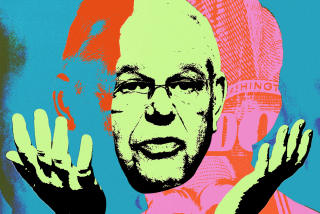IBM Scandal Is Equal Parts Spectator Sport and Lesson
BUENOS AIRES — The lineup of defendants in Argentina’s politically charged IBM scandal resembles the guest list for an exclusive gathering of the financial and governmental elite.
The 30 defendants include ousted top executives of IBM Argentina, the entire former board of directors of state-owned Banco de la Nacion, Argentina’s largest bank, and a former aide to the nation’s president.
They all face charges of fraud and bribery in connection with a $250-million contract awarded to IBM in 1994 to computerize Banco Nacion.
It was a dream project--the stuff that corporate and government careers are made of. But after the disappearance of $21 million paid by IBM to a subcontractor, an alleged front for bribes, the dream disintegrated--along with several illustrious careers. In the aftermath, IBM has taken an unseemly public pounding.
Three high-ranking IBM Argentina executives were forced out after an internal inquiry, though the company says its investigation found no evidence of law-breaking. The bank canceled the contract. Argentine and U.S. investigators are looking into whether IBM executives in the United States committed crimes. And now Argentines are questioning other IBM contracts, worth hundreds of millions of dollars, with federal and provincial government agencies here.
“The relationship between IBM and the national government is not at all clear,” said Carlos “Chacho” Alvarez, a leader of the congressional opposition who has alleged criminal misconduct in a separate IBM contract with the federal tax agency. “IBM gained contracts that were very beneficial for the company and very damaging to the Argentine state.”
In a nation where scandals seem as frequent and popular as soccer games, the IBM affair has attracted rapt and gleeful interest. It offers irresistible ingredients: the predicament of a prestigious U.S. corporation, political intrigue and, according to some analysts, a lesson in how corruption persists and evolves in developing nations as they try to modernize and reform.
The case shows how the globalized economy creates fertile ground for bribery wherever corporations compete for emerging markets, said Luis Moreno Ocampo, a former federal prosecutor and anti-corruption specialist. Moreno’s consulting firm does a thriving business advising government agencies and corporations on how to fight graft.
To Moreno, the characterization of IBM by its defenders--as a hapless victim of an Argentine culture permeated by bribery--distorts the reality of corruption in the developing world. Corporations and governments from industrialized nations must shoulder much of the blame, he said.
*
“This idea that you can only do business in these countries by paying bribes is false and serves as a justification,” Moreno said. “Countries that export technology are the ones that pay bribes. The problem of corruption is the economic problem of today’s world. We have a global economy without a global law, a global judge or a global citizenry.”
Moreno is the Argentine representative of Transparency International, a worldwide anti-corruption organization. Corruption worsens the inequality between developed and undeveloped nations, according to Transparency.
In contrast to some European nations that tolerate corporate crime overseas, the U.S. does not. It enforces its Foreign Corrupt Practices Act of 1977. Convictions under the law are rare because of the inherently difficult nature of the cases, but prosecutions have caused considerable legal headaches for numerous blue-chip U.S. companies.
U.S. federal prosecutors, the FBI and the Securities and Exchange Commission are looking into the IBM-Banco Nacion case. Their objective is to determine if a U.S. citizen or an employee of a U.S. company bribed an Argentine government official.
In Argentina, the cases related to IBM keep multiplying. On July 31, a magistrate charged 18 suspects--including IBM executives and provincial bankers--in an alleged fraud related to a contract in the province of Santa Fe.
The troubles engulfing IBM show how far Argentina has to go in eradicating dishonesty in business and government, according to Alvarez.
As have other Latin American nations, Argentina has pursued a neoliberal program of cutting a bloated bureaucracy, privatizing public services and modernizing the technology used by the government. This approach is described as the long-term structural cure for graft. And certain forms of official rapacity--it used to take a year and $1,000 under the table to get a phone installed--have faded.
*
But here and in other Latin American nations, notably Mexico, the very process of selling off state-run companies and services generates lucrative new opportunities for illegal enrichment, critics say. Argentines reacted with a mix of disgust and I-told-you-so relish to a recent international poll of executives in which Argentina leaped 20 spots this year on a ranking of corrupt places to do business.
Alvarez alleges that IBM has merely replaced the insiders club of big Argentine companies that once shelled out kickbacks and controlled government contracting.
“Corruption in the state apparatus survives,” Alvarez said.
IBM has responded with a spirited public defense. It sued Banco Nacion in July for revoking the contract, demanding $86 million plus damages. The new president of IBM Argentina has taken to the airwaves and met with President Carlos Menem to counter what a spokesman called an unfair wave of attacks.
“IBM has a worldwide reputation for integrity, honesty and high business conduct,” company spokesman Fred McNeese said in a telephone interview from the firm’s Armonk, N.Y., headquarters. “Any time that is questioned, anywhere in the world, we do not take that lightly. While we would prefer to concentrate on our business and serving our customers in Argentina, those who think they can attack IBM without us responding vigorously are mistaken.”
Just as IBM’s reputation makes it an unlikely villain, another irony is that the scandal has swirled around the figure of Domingo Cavallo, Argentina’s high-profile former economy minister, who resigned for unrelated reasons in July.
Cavallo was considered a leading architect of reform. Last year, he set off a government crisis with his impassioned denunciations of a criminal “mafia,” allegedly led by an influential businessman, that he accused of infiltrating the national postal service and other agencies.
Political rivals retaliated, according to Cavallo’s admirers in the diplomatic and financial communities, by using a malleable judiciary and media to exaggerate the IBM furor and damage Cavallo. Banco Nacion is part of the Economy Ministry, and the bank’s fallen president, Aldo Dadone, was a close ally of Cavallo.
“There is no doubt IBM was caught in the middle here,” said an executive of a U.S. corporation that does business in Argentina and who asked not to be named. “It was a visible target, caught between warring parties.”
Taking another view is Moreno, the anti-corruption activist and former prosecutor. He maintains that there appears to have been wrongdoing in the IBM case--but acknowledged that the judiciary has indeed been used as a political weapon.
“Even Minister Cavallo said that Dadone had disappointed him,” Moreno said. “This case does not create suspicions of political persecution because there appear to have been strange goings-on. . . . But there are other members of Cavallo’s team who have been attacked without reason. In a context of widespread corruption, accusations of corruption can be used with political ends.”
*
The Argentine investigating magistrate last month spent a week in New York scrutinizing financial records and meeting with U.S. federal prosecutors. The judge, Adolfo Bagnasco, said he is investigating whether executives of IBM in New York were aware of the crimes allegedly committed in Argentina. Once Bagnasco’s investigation is complete, the case will go to trial before another judge.
“This is not just another IBM contract,” Bagnasco said in an interview here. “That is so much the case that the headquarters sent people to Argentina to supervise the contract. Not just because of the amount but because IBM was the integrator, which meant it would put the equipment in operation, supervise training, etc.”
The contract called for a comprehensive modernization of the technologically primitive Banco Nacion and its far-flung branches, an initiative known as Project Centenary. Former visitors to the bank say that ancient adding machines were the main technology visible in the sprawling headquarters in Buenos Aires. Bank executives proudly described Project Centenary as a leap into the 21st century.
But the indictment alleges that the deal was the product of an elaborate conspiracy. The judge accuses executives of IBM, the bank, the international accounting firm Deloitte & Touche and a politically connected subcontracting company of plotting to defraud the government and inflate the price with unnecessary costs and services.
The $250-million price tag was allegedly rigged to come in just under a limit designated by Banco Nacion, according to Bagnasco, who cites expert analysis that the price was excessive by as much as $100 million.
IBM counters that the court’s analysts fail to understand the magnitude of the undertaking. “We have serious problems with the findings of the expert witnesses,” spokesman McNeese said.
Investigators focused on a $37-million subcontract for an unusual backup software system granted to CCR, a small software company linked to Juan Carlos Cattaneo. Cattaneo, a power broker of Argentina’s ruling party, served as deputy cabinet secretary to Menem from 1993 until last August. Cattaneo’s role is at the root of the scandal: He created CCR’s parent company, Consad, and reportedly maintained a longtime business and personal relationship with executives of IBM Argentina.
The company linked to Cattaneo and his brother, Marcelo, was paid the $21 million that disappeared, Bagnasco said. The money was allegedly diverted to bank accounts in Switzerland, Uruguay and the U.S. The company performed no discernible services in exchange for the money, the indictment says.
“We haven’t found money in anyone’s pockets yet,” Bagnasco said. “But we believe IBM invented expenses . . . in order to have money free to pay bribes.”
The allegations surfaced after the Argentine tax agency discovered what it called an intricate tax-evasion scam by the subcontractors involving payments to a dead man and other fake recipients. On this point, IBM agrees that money is missing.
*
“We are out the $21 million,” McNeese said. “We would like to know where it went. We have been unable to find sufficient value for the money that was paid.”
An internal investigation by the company concluded that executives made “poor management decisions” in regard to the subcontract and did not “follow IBM practices and procedures,” McNeese said. That report resulted in the firing of Gustavo Soriani, the vice president at the helm of the Banco Nacion project. The president of IBM Argentina, Ricardo Martorana, and the chief financial officer, Javier Orcoyen, were allowed to resign.
Soriani and Martorana were among those indicted this year. As far as IBM is concerned, McNeese said, “our investigation did not turn up evidence of illegal activity. There may or may not have been; we did not find any.”
Meanwhile, another investigative judge has responded to a complaint from opposition congressional deputies by initiating an investigation of a $515-million IBM contract with the federal tax agency known as DGI. The critics allege that the DGI contract was overpriced and approved without proper bidding.
IBM argues once again that, in their rush to condemn the deal, the critics do not grasp the complex and costly nature of the high-tech services involved.
And defenders of the accused former IBM officials and the bank find it hard to believe that such prominent figures would take such a risk, especially because IBM faced little competition for the contracts.
The explanation is simple, Bagnasco responded. “The motive is money,” the judge said. “And on the part of the IBM executives, the prestige of winning an important contract. This shows how dangerous corruption can be. You find it in places that were thought to be the cleanest.”
More to Read
Sign up for Essential California
The most important California stories and recommendations in your inbox every morning.
You may occasionally receive promotional content from the Los Angeles Times.










